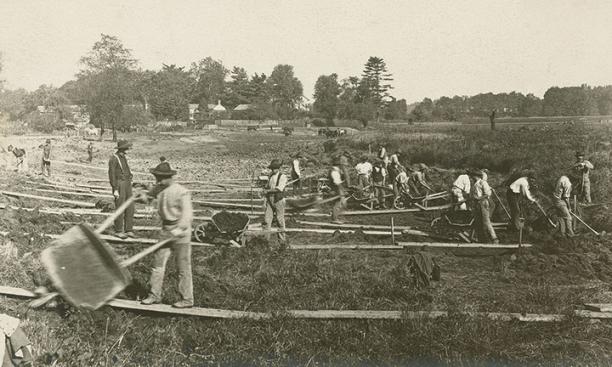
The creation of a lake on Princeton’s southern flank was not among University President Woodrow Wilson’s priorities, but Andrew Carnegie saw things differently. The Scottish-American industrialist-turned-philanthropist had a soft spot for man-made lochs, having adorned his own estate with them, and an intense dislike of football — “that bloody game,” as he once put it.
What better gift, therefore, than a lake and the wholesome pastimes it would allow the University to cultivate. Football, he declared, is “often managed and played ... in a manner very far from reflecting credit upon it or upon its devotees. ... Should sporting people of this class ever happen to visit Princeton, I hope the example of the aquatic branch of sport will sink deep into their hearts and effect needed amendment.”
Carnegie voiced these sentiments on Dec. 5, 1906, when, in Alexander Hall, he presented the lake that would tie his name to Princeton. It was a magnificent gift. The Daily Princetonian reported that nearly two years of labor had produced a shallow body of water covering 322 acres, stretching 3 1/2 miles, and necessitating the removal of 270,000 cubic yards of earth. The Prince’s editors urged “every Princeton man to make Mr. Carnegie realize that his generous gift is thoroughly appreciated,” and the students responded with enthusiasm.
They met his special train at the station, then at the foot of Blair Arch, which was festooned with a banner proclaiming “Welkum to the Laird of Skibo” — a nod to his work in the field of spelling reform and his palatial home in northern Scotland. And when, in cap and gown, he entered Alexander Hall, they regaled him with a song that ended, “Andy, Andy, you’re a dandy! Car-ne-gie!” Wilson, perhaps hoping for further gifts, expressed the wish that his guest would “hereafter regard yourself as an adopted son of Old Nassau,” but Lake Carnegie was destined to be the magnate’s only Princeton legacy.
John S. Weeren is founding director of Princeton Writes and a former assistant University archivist.
